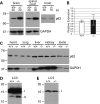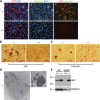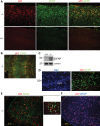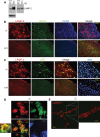Defective autophagy in neurons and astrocytes from mice deficient in PI(3,5)P2
- PMID: 19793721
- PMCID: PMC2778378
- DOI: 10.1093/hmg/ddp460
Defective autophagy in neurons and astrocytes from mice deficient in PI(3,5)P2
Abstract
Mutations affecting the conversion of PI3P to the signaling lipid PI(3,5)P(2) result in spongiform degeneration of mouse brain and are associated with the human disorders Charcot-Marie-Tooth disease and amyotrophic lateral sclerosis (ALS). We now report accumulation of the proteins LC3-II, p62 and LAMP-2 in neurons and astrocytes of mice with mutations in two components of the PI(3,5)P(2) regulatory complex, Fig4 and Vac14. Cytoplasmic inclusion bodies containing p62 and ubiquinated proteins are present in regions of the mutant brain that undergo degeneration. Co-localization of p62 and LAMP-2 in affected cells indicates that formation or recycling of the autolysosome is impaired. These results establish a role for PI(3,5)P(2) in autophagy in the mammalian central nervous system (CNS) and demonstrate that mutations affecting PI(3,5)P(2) can contribute to inclusion body disease.
Figures








References
-
- Zhang Y., Zolov S.N., Chow C.Y., Slutsky S.G., Richardson S.C., Piper R.C., Yang B., Nau J.J., Westrick R.J., Morrison S.J., et al. Loss of Vac14, a regulator of the signaling lipid phosphatidylinositol 3,5-bisphosphate, results in neurodegeneration in mice. Proc. Natl Acad. Sci. USA. 2007;104:17518–17523. - PMC - PubMed
Publication types
MeSH terms
Substances
Grants and funding
LinkOut - more resources
Full Text Sources
Molecular Biology Databases
Research Materials
Miscellaneous

